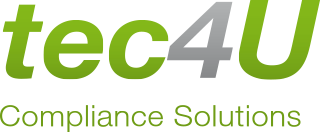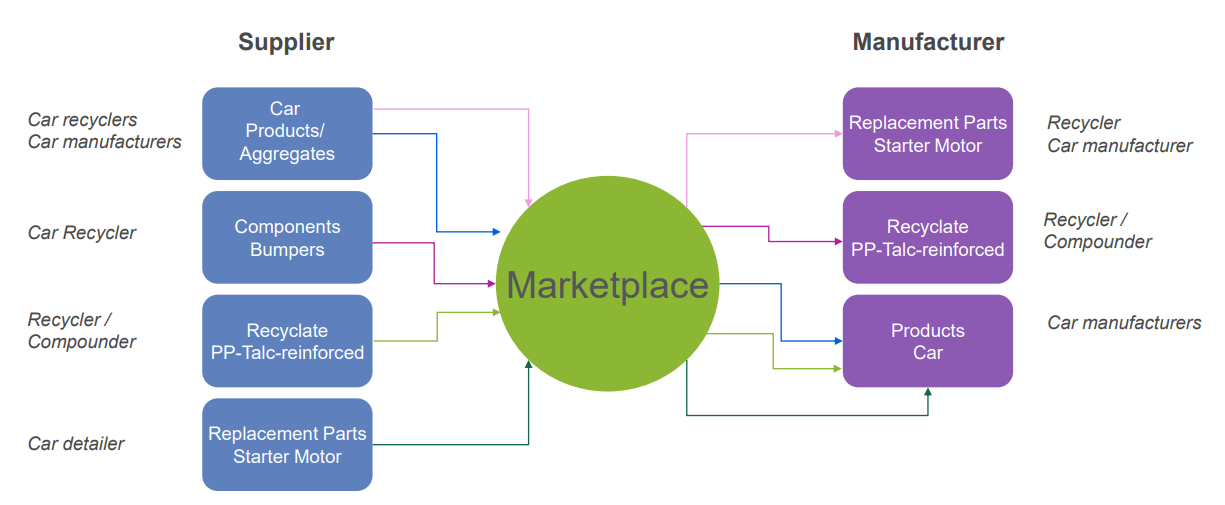tec4U-Solutions is currently designing and implementing a marketplace for the circular economy. In the future, this marketplace is intended to be used for trading products, components, semi-finished goods, and materials to ensure high-quality and economical production and marketing of secondary raw materials and vehicle parts. Suppliers of products for replacement systems – such as engines or alternators – are expected to be able to offer these, as well as products intended for further dismantling, via the platform. Similarly, sub-products such as bumpers, fender liners, or PET bottles will be able to be offered. Ultimately, suppliers of recycled materials should also be able to position these on the platform. On the buyer side, the platform is expected to offer manufacturers of replacement parts, recycled materials, or processors of recycled materials the opportunity to procure the corresponding raw materials.
We would like to invite anyone who is interested in the marketplace or would like to help develop it with us to join us in this effort.
How does the Circular Economy Marketplace from tec4U-Solutions support a functioning circular economy?
In light of recent geopolitical developments, German and European industry has come to recognize that resource availability is a key factor in determining production locations in Germany and Europe. In this context, various regulations and directives have been issued to better ensure resource availability. To this end, regulations were primarily used that were originally intended to implement sustainability requirements. In addition to requirements for reducing energy consumption (CO2), there is now a strong focus on ensuring the recyclability of materials and products. An initial and very stringent set of requirements was formulated in the amendment to the End-of-Life Vehicles Regulation, which obliges auto manufacturers to use recycled materials. In addition, the Ecodesign Regulation established the legal framework for the Battery Regulation and the digital product passport. As a leading force in European technology, the automotive industry thus plays a pioneering role in achieving sustainability goals based on the Ecodesign Regulation.
This poses a considerable challenge for all market participants involved. Closing loops is only possible if the dismantling of a vehicle yields resources that are technically and economically viable. The available data – particularly in the automotive industry – already provides a very solid basis for considering the potential recyclability of materials. The use of the fractions of parts resulting from recycling – primarily assemblies, axle or drive components – offers a further opportunity to meet the requirements of the Ecodesign Regulation. If this information is available to recyclers, it not only facilitates the recycling of materials but also promotes the strengthening of replacement parts within the system.
Even if recyclers have the appropriate material and component fractions available, they often lack the necessary distribution channels to offer their products to other market participants. Recyclers also face similar problems, as they do not yet have secure, long-term input channels. It is equally difficult for recyclers to position the very different and, in some cases, very specific recyclates on the market. Ultimately, however, it is also the auto manufacturers themselves who are often looking for opportunities and partners to send the vehicles arriving in their return system to licensed auto recyclers for dismantling and recycling, as well as to obtain high-quality recycled materials and used parts for their replacement parts programs. Equally necessary and desired by auto manufacturers are reliable, long-term contracts in order to comply with legal requirements.
Circular Economy Marketplace – the communication platform for all market participants
All in all, this means that the primary problem in creating circularity, especially in the automotive industry, which is already heavily regulated by legal requirements, is a communication problem. For this reason, it seems not only sensible but also necessary to create a communication platform where the various offers and requests of market participants can be exchanged.
To take advantage of all these benefits and synergies, it is necessary to establish a platform that not only provides communication services but also performs a quality control function. This ensures that technically and economically sensible material streams are created and that high-quality used parts become replacement parts that are as good as new. This measure not only enables the auto manufacturer to comply with legal obligations but also to achieve economic benefits. A positive side effect of the marketplace could be that it also serves to manage and monitor the entire end-of-life vehicle process.
Your contact: Stefan Nieser. Email: contact@tec4U-solutions.com, Telephone: +49 681/92564-0

